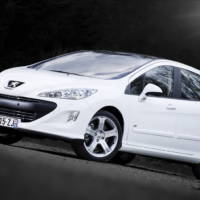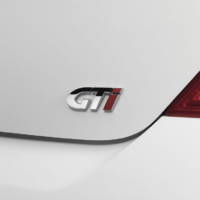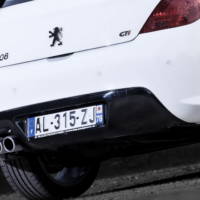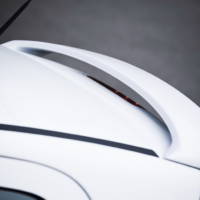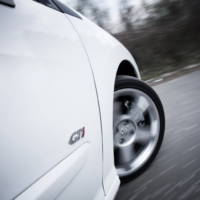The French company has reintroduced the sporty hatch by launching the 2010 Peugeot 308 GTi.
Equipped with a 1.6-litre THP engine that produces 200 PS (147 kW) and 275 Nm (203 lb-ft) of torque, the 2010 Peugeot 308 GTi sends it’s juice to the wheels via a six-speed manual gearbox and takes 7.7 seconds to accelerate from 0 to 100 Km/h.
Consumption levels are of 6.9-litres of fuel per 100 Km while the 2010 Peugeot 308 GTi emits 159 grams of CO2 per Km.
The 2010 Peugeot 308 GTi comes with 18 inch alloy wheels, a new rear spoiler, new exhaust pipes, a lowered front fascia and a carbon like front spoiler lip.
The 2010 Peugeot 308 GTi price starts at 26,900 Euro and sales on the company’s home market will begin on June 10.
Peugeot press release :
Peugeot returns to the world of the GTi with the launch of the 308 GTi, a sporty hatchback for a new era: enjoyable for day to day driving and environmentally-friendly. Available exclusively as a 5 door model only, it combines a modern synthesis of versatility and driveability.
Sporty driving in step with the times
The 308 GTi has a sporty nature that is in tune with our current times:
* well-heeled athleticism for day-to-day driving enjoyment and a high level of onboard comfort at all engine speeds but, stopping short of being a specialist vehicle, yet still able to offer real excitement when its “driver” asks more of it.
* environmentally-friendly, combining good levels of performance with fuel consumption of only 6.9 litres/100 km for 159 g/km of CO2.
The 1.6 litre THP 147 kW (200 bhp) engine – Maximising efficiency
At the heart of the vehicles sporty nature is the all new 1.6 litre THP 147 kW (200 bhp) engine, launched simultaneously in the RCZ Coupé, a key factor in the overall efficiency of the 308 GTi.
Combining a number of innovative technologies – THP (Twin-Scroll turbocharger and direct petrol injection), and VTi (variable valve lift and valve timing) – this engine, mated to a 6-speed manual gearbox, offers high levels of driveability.
Its maximum power of 147 kW is available from 5500 to 6800 rpm, combined with a constant maximum torque of 275 Nm between 1700 and 4500 rpm, the 308 GTi also offers particularly low fuel consumption and CO2 emissions.
The sound of the engine is also particularly distinctive during acceleration thanks to the adoption of Sound System technology.
The car’s chassis has also been adapted to match the characteristics of the engine: fitted with 225/40 R18 tyres, it combines excellent stability at high speed with guaranteed comfort at low speed. 340 mm diameter brake discs at the front and 290 mm at the rear ensure high levels ofbraking performance.
Expressive style
Outside, the 308 GTi makes subtle play of its distinctive features, meeting the wishes of discerning customers who know exactly what will set heads turning.
The 308 GTi stands out from the rest of the range by:
* – a bright black carbon-style insert under the front bumper lower skirt (specificity France),
* – its “Sport” lower front panel derived from the 308 CC,
* – its lower rear bumper panel with Perla Nera black diffuser,
* – its rear spoiler, offering additional efficiency at high speeds,
* – a twin chrome exhaust pipes,
* – “GTi” badges on the side and rear of the body,
* – distinctive interior features, aluminium foot rest and gear knob, leather sport steering wheel with aluminium flattened lower edge and thumb rests, piano black fascia, … )
The uncompromising sports credentials of the 308
The enthusiast drivers who will buy the 308 GTi will of course also benefit from an exclusive and sporty vehicle, but also from all of the qualities that have made the five-door 308 hatchback a success, in particular:
* High levels of comfort and convenience when inside the car, thanks to its semi-tall
* architecture ensuring exceptional interior brightness, visibility (a glazed surface area of up to 4.86 m2) and interior space, not forgetting its stylish and elegant fascia panel, its build quality and its distinctive acoustics…
* Maximum safety thanks to its structure and high-performance means of restraint (5 stars in the EuroNCAP 2009 test), and also thanks to the “Peugeot Connect SOS” system which pinpoints the vehicle’s location in the event of an accident (optional at only 290 € or standard with WIP Com 3D).
In France, the 308 GTi will be launched on the10th June, priced at 26,900 €.
Detailed technical characteristics
Engine: new 1.6 litre THP147 kw (200 bhp) engine with 6-speed manual gearbox
The new 1.6 litre THP 147 kW (200 bhp) engine under the bonnet of the 308 GTi and the RCZ sports coupé is efficient in every sense of the word: generous torque and power, very low fuel consumption and CO2 emissions, and fully compliant with the Euro 5 emission standard.
Meeting such environmental concerns are a high priority for this engine and are the mark of a modern and responsible approach…
With its maximum torque of 275 Nm (from 1700 rpm and up to 4500 rpm) and its maximum power of 147 kW (from 5500 to 6800 rpm), the 308 GTi benefits from initial and in-gear acceleration of the highest order (80 to 120 kph in 6.7 s in 5th gear; 0 to 100 kph in 7.7 s, 1000 m standing start in 27.8 s…) while its fuel consumption is 6.9 litres/100 km in the combined cycle (159 g/km of CO2).
To achieve these results, this 1598 cm3 four-cylinder engine combines – in a world first – all of the most recent technologies:
* THP (Turbo-charged High-Pressure) with a Twin-Scroll turbocharger for performance and instantaneous response at very low engine speeds; direct petrol injection ensuring optimal fuel consumption;
* VTi (Variable valve and Timing injection) with variable lift of the intake valves coupled with variable timing of the intake and exhaust camshafts, for reduced fuel consumption and CO2 emissions.
The Twin-Scroll turbocharger, for maximum responsiveness
As its name implies, the “Twin-Scroll” turbocharger groups the exhaust ports of each of the cylinders into pairs in the exhaust manifold and turbocharger, combining the exhaust gas flows from cylinders 1 and 4 and those of 2 and 3. Both exhaust gas flows are directed into the turbo-charger “scrolls” and by combining in this optimal fashion, directly onto the turbocharger turbine, ensuring maximum boost.
This configuration, which separates the exhaust gases until the moment they enter the turbocharger turbine, exploits their dynamic properties to the full. The exhaust gas flow can accelerates the turbocharger turbine to a speed of 220,000 rpm. At the same time it drives the compressor, which compresses the air inside the air intake system before it enters the engine. A pressure valve (waste gate) operates if the intake air pressure rises above a maximum boost pressure of 1.3 bars.
This system ensures remarkable engine responsiveness, since the turbo boost begins at 1000 rpm, enabling the engine to produce its maximum torque from just 1700 rpm.
High-pressure direct injection, for optimal overall efficiency
Direct petrol injection makes it possible to combine a high engine output with low fuel consumption. It is also highly efficient in terms of emissions.
A high-pressure pump with two pistons, driven mechanically and mounted at the end of the intake camshaft, supplies the injectors via a stainless-steel distribution rail. The high-pressure injectors spray fuel directly and laterally into the combustion chamber at a maximum pressure of 120 bars.
The fuel, evenly distributed into the combustion chamber, allows improved combustion and therefore enhanced overall efficiency of the engine. In addition, direct injection helps reduce the quantity of incompletely burned fuel by limiting the amount of fuel in contact with the cylinder walls.
This turbocharged petrol engine also benefits from a relatively high compression ratio of 10.5 :1. Variable Valve and Timing Injection (VTi) technology for lower fuel consumption and CO2 emissions
This technology combines a variable timing system on the intake and exhaust camshafts with a variable lift system on the intake valves. The latter (derived from the VALVETRONIC technology of the BMW Group) allows the maximum valve lift to be adjusted gradually according to the position of the accelerator pedal.
The use of this system improves the thermodynamic efficiency of a petrol engine by significantly reducing its fuel consumption (particularly in phases of partial load), and therefore its CO2 emissions.
Sound System technology
The “engine sound” of the 1.6 litre THP 147 kW (200 bhp) engine has also been worked on diligently to meet the requirements of customers with particular demands in terms of acoustics. Sound System technology delivers different harmonics according to vehicle acceleration. Like a real musical instrument, a vibrating membrane with an inbuilt time delay delivers a sonority which is controlled and amplified by an acoustic duct, at the same time controlling the sound level over long journeys.
Wheels and suspension: specific adaptations
The Marque’s know-how
The Marque’s know-how finds full expression, bringing maximum driving enjoyment through efficient and dynamic road holding and impeccable stability, and guaranteeing a high level of comfort and convenience on a daily basis.
The 308 GTi benefits from an already efficient suspension setup derived from platform 2: a McPherson type front suspension and a rear suspension consisting of a rear torsion beam. The 308 GTi adopts, however, a number of special features:
* a front suspension incorporating joints with larger diameter bearings derived from platform 3,
* specific damper settings at the front and rear, with in particular uprated front spring/damper units equipped with 22 mm damper rods compared to 20 mm on other versions.
* 18 inch alloy wheels as standard (“Lincancabur”) clad with 225/40 R18 tyres.
Finally, the ride height is lower by 10 mm, reducing the height of this 308 to 1488 cm and lowering its centre of gravity by a proportional amount. The end result is a well balanced front wheel drive set-up ensuring optimal accuracy and efficiency and maximum driving enjoyment and safety at all times.
Precise and responsive steering
In keeping with the Marque’s recognised know-how in this field, the steering ensures remarkable precision and is highly responsive, factors underpinning the car’s excellent driveability.
The electro-hydraulic power steering (with an output of 650 W depending on circumstances) varies according to vehicle speed, speed of rotation of the steering wheel and steering fluid temperature.
This allows for continuous adaptation of the power supplied and facilitates manoeuvres at low speed.
Braking efficiency
To ensure maximum braking efficiency, both in terms of power and endurance, the car is equipped with generously dimensioned ventilated front brake discs: 340×30 mm.
The specification at the rear is equally generous with 290×12 mm brake discs, a new set-up for the 308.
ESP, as standard, including dynamic stability control (CDS), electronic brake force distribution (EBFD) and emergency brake assist (EBA). The CDS, ASR (traction control) and EBA functions can be disconnected simultaneously (ESP Off) to allow demanding and experienced drivers to fully enjoy the car’s capacities.
The ESP also includes intelligent traction control, a sophisticated traction control system that allows the vehicle to move off and be driven efficiently in adverse road conditions (ice, snow, heavy rain, etc). Under such conditions it automatically adapts its strategy by authorising more or less slip on each of the front wheels.
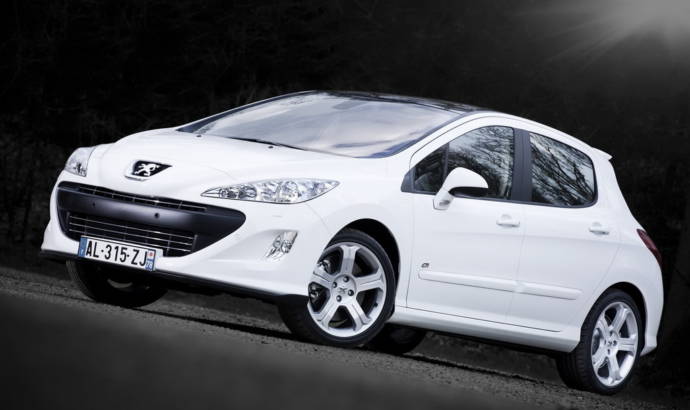
21 May 2010
0

